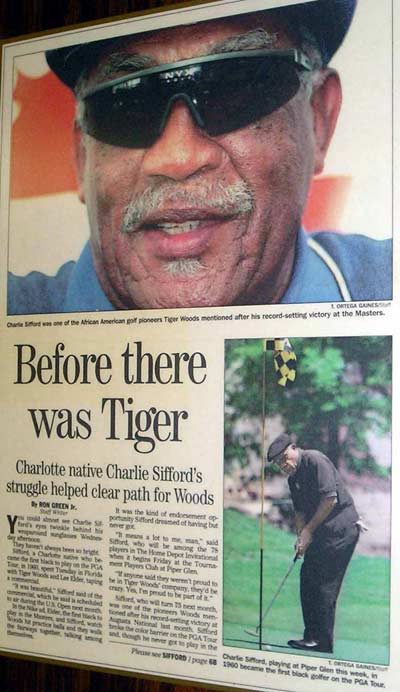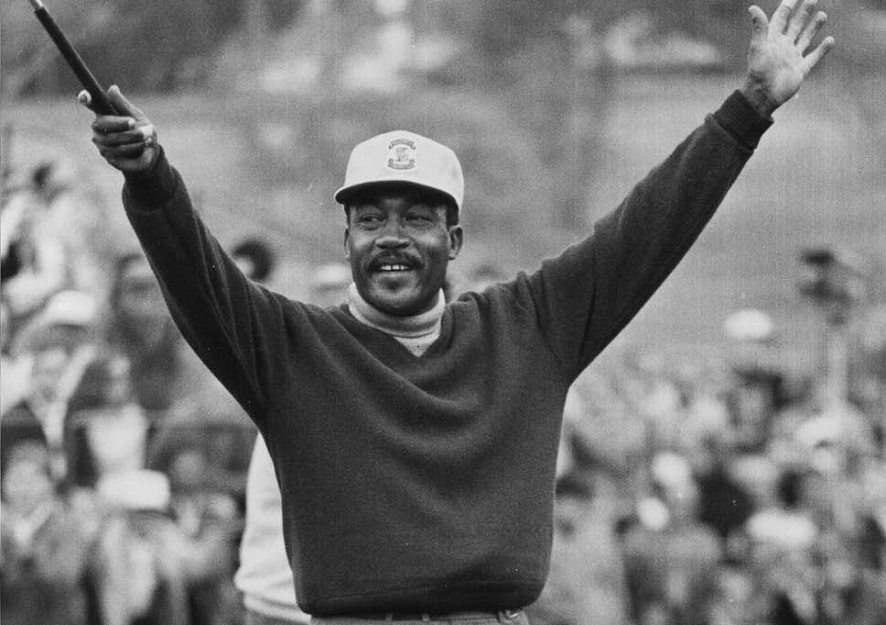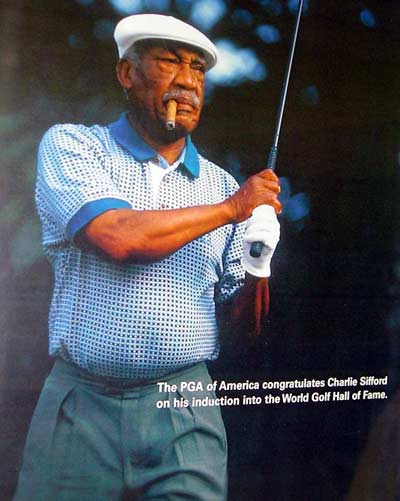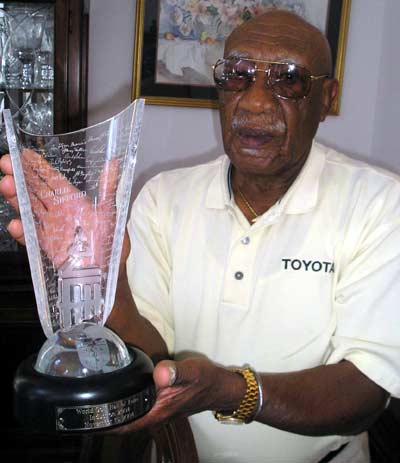Sifford was a professional golfer who was the first African American to play on the PGA Tour. He won the Greater Hartford Open in 1967 and the Los Angeles Open in 1969. He also won the United Golf Association’s National Negro Open six times, and the PGA Seniors’ Championship in 1975.
Not feats to scoff at but they came at a high cost. Sifford had to overcome racial prejudice to help pave way for African-Americans to play on PGA Tour but for years his sacrifice and wrongs done him were largely ignored.
Sifford, relatively small in stature with large hands and fingers as well as massive chest slam out tee shots on the PGA Tour beginning as a caddie in the 1930s as Blacks were barred from playing.

He earned 60 cents a day, gave 50 to his mother and kept 10 cents to buy cigars. Cigars will be his lifelong indulgence. A white player Clayton Heafner taught him golfing technique which will serve him well in the years ahead.
By age of 13, he could shoot par. At 17, however he had to flee Charlotte, his native state to live with relatives in Philadelphia.
“A drunk began calling me names and saying things about my mother,” he explained. “I picked up a Coca-Cola bottle and hit him upside the head. That’s when I left North Carolina. I took a freight [train] to Philly with another caddie, Walter Fergus. No plans. Just get out of town.”

The Caucasian-only clause part of The PGA of America’s by-laws prevented non-whites from membership, and from competing on the PGA Tour. It meant that when Sifford began playing professionally, in the 1950s he couldn’t play in the PGA. The clause was only removed at the 1961 PGA Annual Meeting having exited since 1934.
There’s no saying the number of fine black golfers who were denied the opportunity to play at the very highest level. The likes of Bill Spiller, Pete Brown and Ted Rhodes were kept out of the game except for limited invitations.
Sifford’s 1992 autobiography, “Just Let Me Play,” written with James Gullo, exposed just how shabbily he was treated by the whites.

Despite winning the Long Beach Open in 1957, Sifford wasn’t allowed to compete in the Tour event the following week. Sifford had to fall on California attorney general Stanley Mosk who presented Sifford as a California resident whose civil rights were being violated and asked the Tour to show reasons other than race why Sifford was denied membership.
Pushed against the wall, the PGA made Sifford an approved tournament player in1960, becoming the first black to win the designation a few months from turning 38. Sifford was awarded full PGA membership when he was 42.
But this did not stop the threats and insults while he was still prohibited from eating in dining rooms at many clubhouses.
In solidarity, friends and fellow professionals Bob Rosburg, Jackie Burke Jr., Don January and Bob Goalby opted to eat with him in the locker room.
The NAACP had to come in to protest the discrimination being forced on Sifford such as being dropped from tours as well as forced to sleep in dormitory of an all-black college or stay with a black family while white players lodged at hotels.
There were also death threats and when he considered withdrawing, his wife, Rose urged him on noting, “just keep moving, they’re not going to hurt you on the golf course, but you make sure that you’ve got somebody with you when you go to your car.”
Even on the course his ball was picked and thrown away from the fairway while others hurled insults his way prompting the police to arrive on one occasion on the 14th hole to take the trouble makers away.
Over the past few years, some have tried to right the wrongs against Sifford. In 2004 he became the first black golfer admitted to the World Golf Hall of Fame, under the Lifetime Achievement category for his contributions to the game.

In 2006, the University of St. Andrews, Scotland, awarded him an honorary doctorate, which is where the “Dr. Charlie Sifford” comes from. Sifford, who likes the title, signs autographs that way.
On May 3, 2011, another honor was bestowed closer to home. Charlotte’s old Revolution Park Golf Course was renamed for the man who won five straight United Golfers Association National Negro Opens, the 1967 Greater Hartford Open, the 1969 Los Angeles Open and the 1975 Senior PGA Championship. It was a festive day at the newly-named Dr. Charles L. Sifford Golf Course, with some 300 friends there to honor him. The day was made more significant because the history of the course is so painful for so many.

Other fine black players, such as Jim Dent, Bobby Stroble and Walter Morgan acknowledge that it was Sifford, along with Lee Elder, who paved their way.
Sifford was born in 1922 at Charlotte and for four decades fought racial battles enabling Blacks like Tiger Woods to play and dominate the game. He died on February 3, 2015 in Cleveland, Ohio aged 92.
Tiger Woods named his son Charlie after him and referred to Sifford as “the Grandpa I never had,” and that, without Sifford, “I probably wouldn’t be here.”










